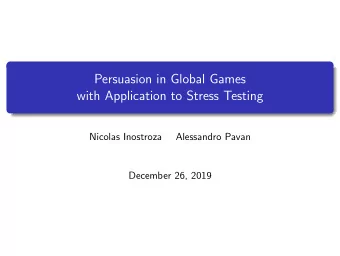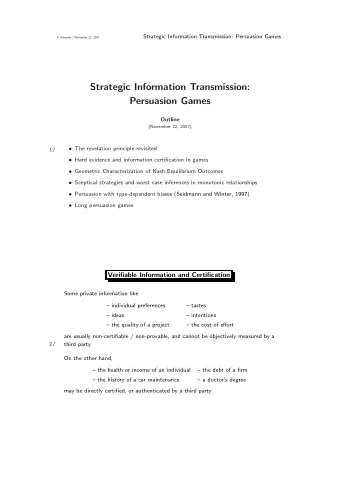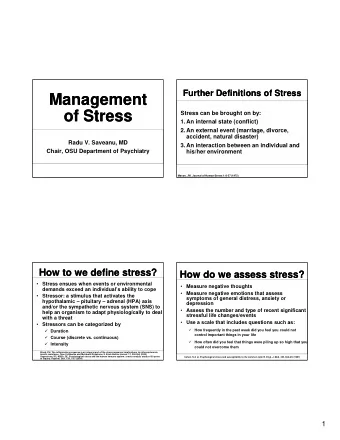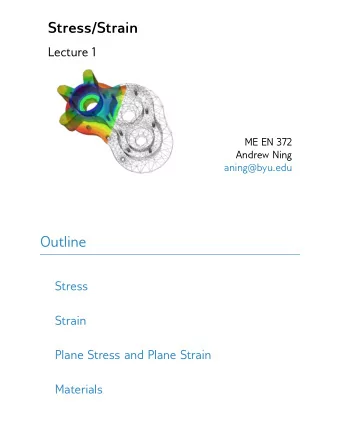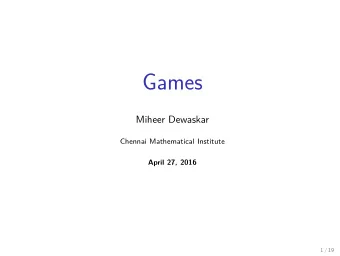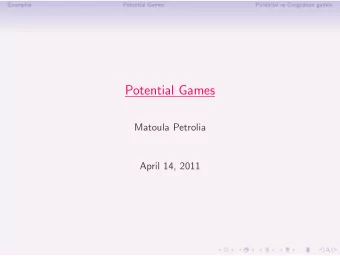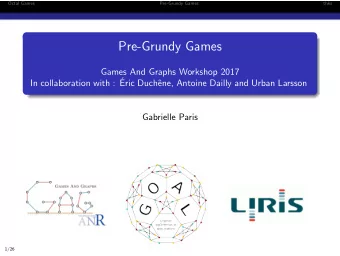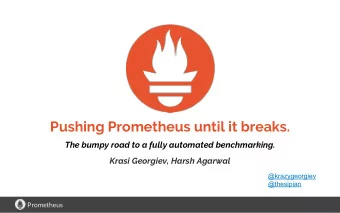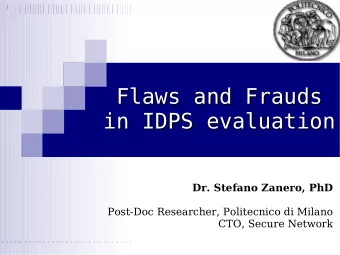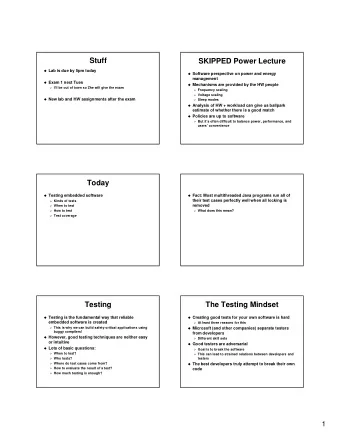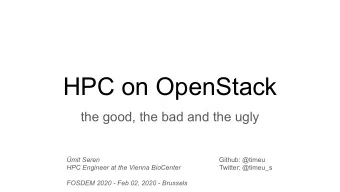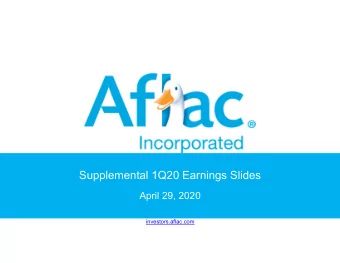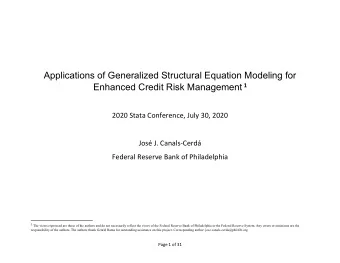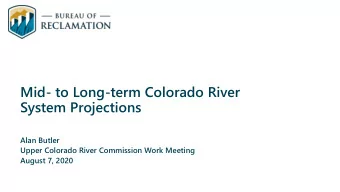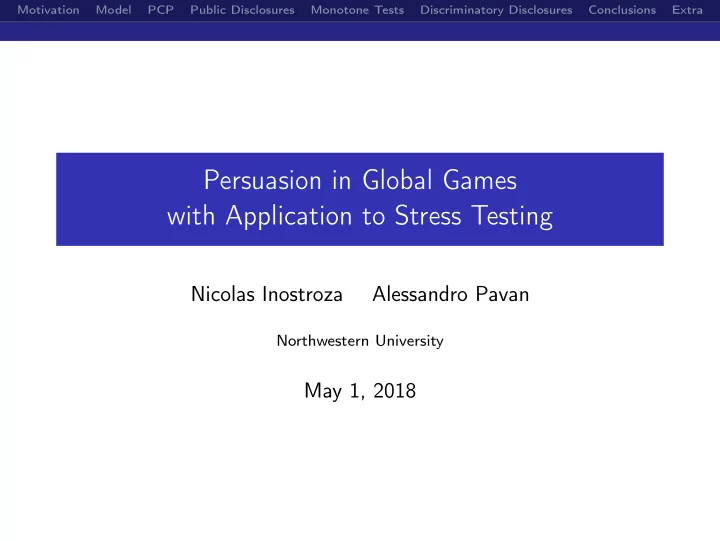
Persuasion in Global Games with Application to Stress Testing - PowerPoint PPT Presentation
Motivation Model PCP Public Disclosures Monotone Tests Discriminatory Disclosures Conclusions Extra Persuasion in Global Games with Application to Stress Testing Nicolas Inostroza Alessandro Pavan Northwestern University May 1, 2018
Motivation Model PCP Public Disclosures Monotone Tests Discriminatory Disclosures Conclusions Extra Persuasion in Global Games with Application to Stress Testing Nicolas Inostroza Alessandro Pavan Northwestern University May 1, 2018
Motivation Model PCP Public Disclosures Monotone Tests Discriminatory Disclosures Conclusions Extra Motivation Coordination: central to many socio-economic environments Damages to society of mis-coordination can be severe Monte dei Paschi di Siena (MPS) creditors with heterogenous beliefs about size of nonperforming loans default by MPS: major crisis in Eurozone (and beyond) Government intervention limited by legislation passed in 2015 Persuasion (stress test design): instrument of last resort
Motivation Model PCP Public Disclosures Monotone Tests Discriminatory Disclosures Conclusions Extra Questions Structure of optimal stress tests? What information should be passed on to mkt? “Right” notion of transparency? Optimality of pass/fail policies monotone rules Benefits to discriminatory disclosures? Properties of persuasion in global games?
Motivation Model PCP Public Disclosures Monotone Tests Discriminatory Disclosures Conclusions Extra Related literature Persuasion and Information design: Myerson (1986), Aumann and Maschler (1995), Calzolari and Pavan (2006,a,b), Glazer and Rubinstein (2004, 2012), Rayo and Segal (2010), Kamenica and Gentzkow (2011), Ely (2016), Bergemann and Morris (2017), Lipnowski and Mathevet (2017), Mathevet, Pearce, Stacchetti (2017),... Persuasion in Games: Alonso and Camara (2013), Barhi and Guo (2016), Taneva (2016), Mathevet, Perego, Taneva (2017)... Persuasion with ex-ante heterogenous receivers: Bergemann and Morris (2016), Kolotilin et al (2016), Laclau and Renou (2017), Chan et al (2016), Basak and Zhou (2017), Che and Horner (2017), Doval and Ely (2017), Guo and Shmaya (2017)... Discrimination and “Divide and Conquer”: Segal (2006), Wang (2015), Yamashita (2016)... Financial Regulation and Stress Test Design: Goldstein and Leitner (2015), Goldstein and Sapra (2014), Alvarez and Barlevy (2017), Bouvard et al. (2015), Goldstein and Huang (2016), Williams (2017),... Global Games w. Endogenous Info: Angeletos, Hellwig and Pavan (2006, 2007), Angeletos and Pavan (2013), Edmond (2013), Iachan and Nenov (2015), Denti (2016), Yang (2016), Morris and Yang (2017),...
Motivation Model PCP Public Disclosures Monotone Tests Discriminatory Disclosures Conclusions Extra Plan Model Perfect coordination property Public disclosures Pass/Fail Policies Monotone rules Benefits of discriminatory disclosures Extensions and conclusions
Motivation Model PCP Public Disclosures Monotone Tests Discriminatory Disclosures Conclusions Extra Global Games of Regime Change Policy maker (PM) Agents i 2 [ 0 , 1 ] Actions ( 1 ( attack ) a i = 0 ( not attack ) A 2 [ 0 , 1 ] : aggregate attack Regime outcome: r 2 { 0 , 1 } , with r = 1 in case of regime change (e.g., default) Regime rule ( 1 if A > θ r = 0 A θ if “fundamentals” θ parametrize amount of performing loans Supermodular game w. dominance regions: ( � ∞ , 0 ) and [ 1 , + ∞ )
Motivation Model PCP Public Disclosures Monotone Tests Discriminatory Disclosures Conclusions Extra Global Games of Regime Change PM’s payo ff ( W if r = 0 U P ( θ , A ) = L < W if r = 1 . Agents’ payo ff from attacking (safe action) normalized to zero Agents’ payo ff from not attacking ( g if r = 0 u ( θ , A ) = if r = 1 b with g > 0 > b
Motivation Model PCP Public Disclosures Monotone Tests Discriminatory Disclosures Conclusions Extra Beliefs x = ( x i ) i 2 [ 0 , 1 ] 2 X : beliefs/signal profile with each x i ⇠ p ( ·| θ ) ˜ i.i.d., given θ
Motivation Model PCP Public Disclosures Monotone Tests Discriminatory Disclosures Conclusions Extra Disclosure Policies m : [ 0 , 1 ] ! S messag e function m i 2 S : information disclosed to i M ( S ) : set of all possible message functions with range S Disclosure policy Γ = ( S , π ) with π : Θ ! ∆ ( M ( S )) Non discriminatory disclosures: m i = m j all i , j 2 [ 0 , 1 ] , θ 2 Θ , m 2 supp [ π ( θ )]
Motivation Model PCP Public Disclosures Monotone Tests Discriminatory Disclosures Conclusions Extra Timing 1 PM announces Γ = ( S , π ) and commits to it 2 ( θ , x ) realized 3 m drawn from π ( θ ) 2 ∆ ( M ( S )) 4 Information m i disclosed to agent i 2 [ 0 , 1 ] 5 Agents simultaneously choose whether or not to attack 6 Regime outcome and payo ff s
Motivation Model PCP Public Disclosures Monotone Tests Discriminatory Disclosures Conclusions Extra Solution Concept: MARP Robust/adversarial approach PM can not select agents’ strategy profile Most Aggressive Rationalizable Profile (MARP): minimizes PM’s payo ff across all profiles surviving iterated deletion of interim strictly dominated strategies (IDISDS) a Γ ⌘ ( a Γ i ) i 2 [ 0 , 1 ] : MARP consistent with Γ
Motivation Model PCP Public Disclosures Monotone Tests Discriminatory Disclosures Conclusions Extra Perfect Coordination Property [PCP] Definition Γ = { S , π } satisfies PCP if, for any ( θ , x ) , any message function m 2 supp ( π ( θ )) , any i , j 2 [ 0 , 1 ] , a Γ i ( x i , m i ) = a Γ j ( x j , m j ) , where a Γ ⌘ ( a Γ i ) i 2 [ 0 , 1 ] is MARP consistent with Γ
Motivation Model PCP Public Disclosures Monotone Tests Discriminatory Disclosures Conclusions Extra Perfect Coordination Property [PCP] Theorem Given any (regular) Γ , there exists (regular) Γ ⇤ satisfying PCP and yielding PM a payo ff weakly higher than Γ . Regularity: regime outcome under MARP measurable wrp PM’s information
Motivation Model PCP Public Disclosures Monotone Tests Discriminatory Disclosures Conclusions Extra Perfect Coordination Property [PCP] Policy Γ ⇤ = ( S ⇤ , π ⇤ ) removes any strategic uncertainty It preserves (and, in some cases, enhances) heterogeneity in structural uncertainty Under Γ ⇤ , agents know actions all other agents take but not what beliefs rationalize such actions Inability to predict beliefs that rationalize other agents’ actions essential to minimization of risk of regime change “Right” form of transparency conformism in beliefs about mkt response ...not in beliefs about “fundamentals”
Motivation Model PCP Public Disclosures Monotone Tests Discriminatory Disclosures Conclusions Extra PCP: Proof sketch Let r ( ω ; a Γ ) 2 { 0 , 1 } be regime outcome at ω ⌘ ( θ , x , m ) when agents play according to a Γ Let Γ ⇤ = { S ⇤ , π ⇤ } be s.t. S ⇤ = S ⇥ { 0 , 1 } and π ⇤ (( m , r ( ω ; a Γ )) | θ ) = π ( m | θ ) , all ( θ , m ) s.t. π ( m | θ ) > 0 Key step : r ( ω ; a Γ ) = 0 ) MARP under Γ ⇤ less aggressive than MARP under Γ , i.e., i ( x i , m i ) = 0 ) a Γ ⇤ a Γ i ( x i , ( m i , 0 )) = 0 , 8 i , 8 ( x i , m i ) Size of attack under Γ ⇤ smaller than under Γ ) r ( ω ; a Γ ⇤ ) = 0 That Γ ⇤ weakly improves upon Γ follows from probability of regime change under Γ ⇤ same as under Γ (all θ ) size of attack when r = 0 smaller under Γ ⇤ (relevant for more general payo ff s). (formal proof)
Motivation Model PCP Public Disclosures Monotone Tests Discriminatory Disclosures Conclusions Extra PCP: Lesson Optimal policy combines: public Pass/Fail announcement eliminate strategic uncertainty additional (possibly discriminatory) disclosures
Motivation Model PCP Public Disclosures Monotone Tests Discriminatory Disclosures Conclusions Extra PCP – General Optimality of PCP extends to economies in which regime outcome determined by more general rule R ( θ , A ) PM’s payo ff ( W ( θ , A ) if r = 0 U P ( θ , A ) = L ( θ ) if r = 1 with (a) W A ( θ , A ) 0; (b) W ( θ , A ) � L ( θ ) � 0 if R ( θ , A ) > 0 finitely many agents with asymmetric payo ff s u i ( θ , A ) arbitrary collection of beliefs Λ i ( x i ) 2 ∆ ( Θ ⇥ X ) level-K sophistication PM has imperfect information about θ and agents’ beliefs Key assumptions: supermodularity of game measurability of regime outcome under MARP wrt PM’s info
Motivation Model PCP Public Disclosures Monotone Tests Discriminatory Disclosures Conclusions Extra Public Disclosures Designer constrained to non-discriminatory policies π : Θ ! ∆ ( M ( S )) s.t. m i = m j all m 2 supp ( π ( θ )) , all θ . Optimality of PCP extends to such environments Theorem Suppose p ( x | θ ) log-supermodular. Given any non-discriminatory policy Γ , there exists binary (non-discriminatory) policy Γ ⇤ = ( S ⇤ , π ⇤ ) in which S ⇤ = { 0 , 1 } satisfying PCP and yielding higher payo ff than Γ . Optimal non-discriminatory policy: stochastic pass/fail test Log-SM of p ( x | θ ) ) MLRP (co-movement between state θ and belies x ) MARP in threshold strategies: signals other than regime outcome can be dropped (averaging over m ) without a ff ecting incentives (Example)
Recommend
More recommend
Explore More Topics
Stay informed with curated content and fresh updates.

